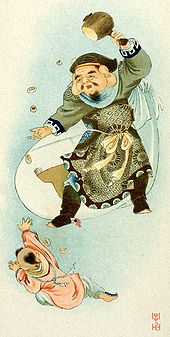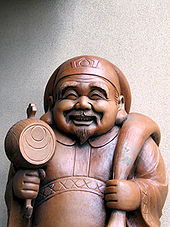- Daikoku-ten
-
In Japan, Daikokuten (大黒天), literally, god of great Darkness or Blackness, is one of the Seven Gods of Fortune. Daikokuten evolved from the Hindu deity, Shiva. The name is the Chinese and Japanese equivalent of Mahakala, another name for Shiva.[citation needed]
Daikoku's images are found in the temples of Tibet and China and the god enjoys an exalted position as a household deity in Japan. Daikoku's association with wealth and prosperity gave rise to a strange custom known as Fuku-nusubi. This custom started with the belief that he who stole divine figures (gods and goddesses) was assured of good fortune, if not caught in the act of stealing. In the course of time stealing of divine images became so common a practice in Japan that the Toshi-no-ichi or the ‘year-end-market’ held in the Asakusa Kannon temple became the main venue of the sale and disposal of such images by the fortune-seekers. Many small stalls were opened where articles including images of Daikoku or Mahakala were sold on the eve of New Year celebrations.
The Japanese also maintain the symbol of Mahakala as a monogram. The traditional pilgrims climbing the holy Mount Ontake wear tenugui on white Japanese scarves with the seed syllable of Mahakala.
Daikoku is variously considered to be the god of wealth, or of the household, particularly the kitchen. He is recognised by his wide face, smile, and a flat black hat. He is often portrayed holding a golden mallet called an Uchide no Kozuchi, otherwise known as a magic money mallet, and is seen seated on bales of rice, with mice nearby (mice signify plentiful food).
Daikoku's image was featured on the first Japanese bank note, designed by Edoardo Chiossone.
References
- Japan and Indian Asia by Hajime Nakamura. Publisher: Firma KLM, 1961. Publication Date: 1961
- India and Japan: A Study in interaction during 5th cent - 14th century - By Upendra Thakur .
See also
Japanese mythology Mythic texts Kojiki | Nihon Shoki | Fudoki | Kujiki | Kogo Shūi | Hotsuma Tsutae | Nihon Ryōiki | Konjaku Monogatarishū | Shintōshū

Japanese creation myth Takamagahara mythology Izumo mythology Hyuga mythology Human age Mythical locations Major Buddhist figures Seven Lucky Gods Shinto deities | Japanese deities | Sacred objects | Japanese religions Categories:- Japanese mythology stubs
- Japanese gods
- Agricultural gods
- Fortune gods
Wikimedia Foundation. 2010.


